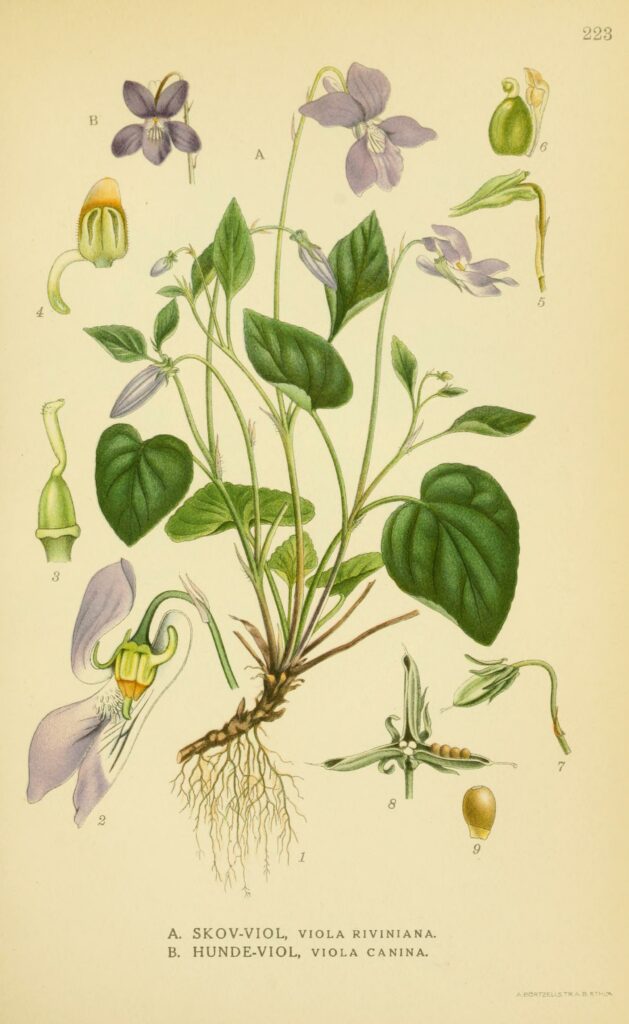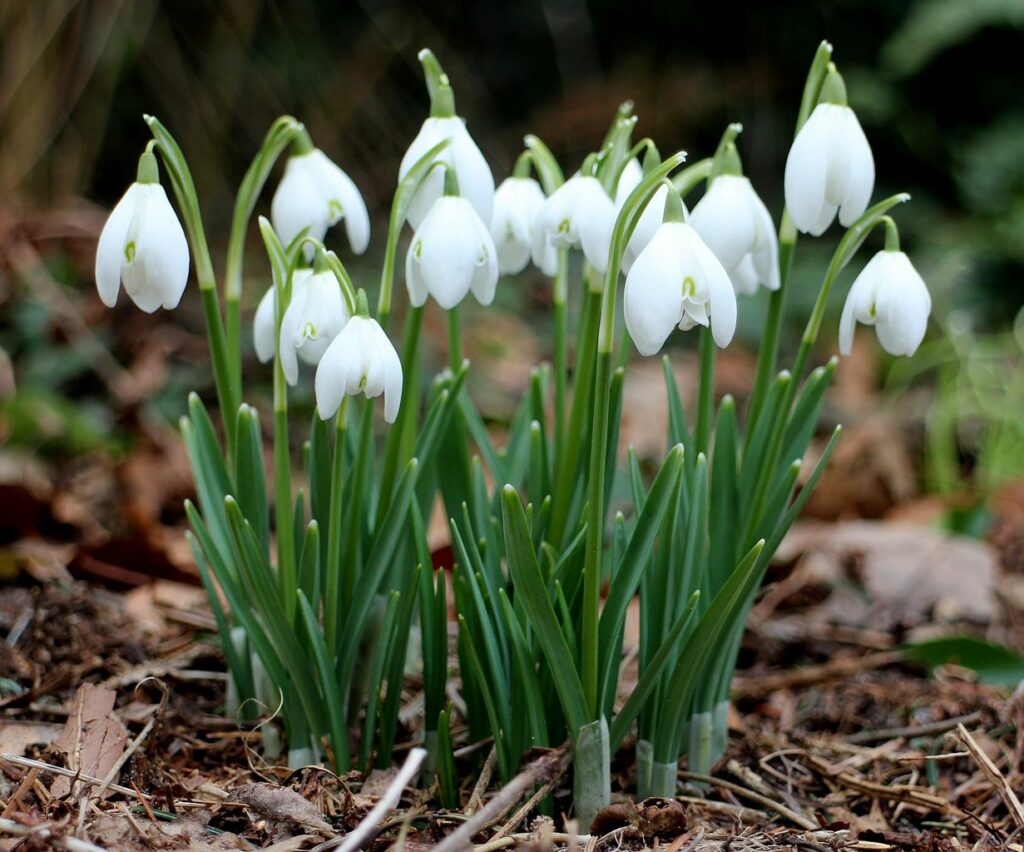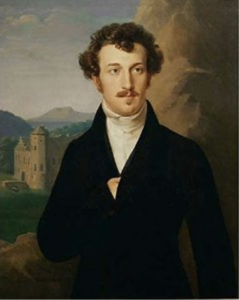Violet
(Poet's title: Viola)
Set by Schubert:
D 786
[March 1823]
Schneeglöcklein, o Schneeglöcklein,
In den Auen läutest du,
Läutest in dem stillen Hain,
Läute immer, läute zu.
Denn du kündest frohe Zeit,
Frühling naht, der Bräutigam,
Kommt mit Sieg vom Winterstreit,
Dem er seine Eiswehr nahm.
Darum schwingt der gold’ne Stift,
Dass dein Silberhelm erschallt,
Und dein liebliches Gedüft
Leis wie Schmeichelruf entwallt,
Dass die Blumen in der Erd’
Steigen aus dem düstern Nest
Und des Bräutigams sich wert
Schmücken zu dem Hochzeitfest.
Schneeglöcklein, o Schneeglöcklein,
In den Auen läutest du,
Läutest in dem stillen Hain,
Läut die Blumen aus der Ruh.
Du Viola, zartes Kind,
Hörst zuerst den Wonnelaut,
Und sie stehet auf geschwind,
Schmücket sorglich sich als Braut,
Hüllet sich ins grüne Kleid,
Nimmt den Mantel sammetblau,
Nimmt das güldene Geschmeid
Und den Brilliantententau.
Eilt dann fort mit mächt’gem Schritt,
Nur den Freund im treuen Sinn,
Ganz von Liebesglut durchglüht,
Sieht nicht her und sieht nicht hin.
Doch ein ängstliches Gefühl
Ihre kleine Brust durchwallt,
Denn es ist noch rings so still,
Und die Lüfte wehn so kalt,
Und sie hemmt den schnellen Lauf,
Schon bestrahlt von Sonnenschein;
Doch mit Schrecken blickt sie auf,
Denn sie stehet ganz allein.
Schwestern nicht – nicht Bräutigam –
Zugedrungen – und verschmäht –
Da durchschauert sie die Scham,
Fliehet wie vom Sturm geweht,
Fliehet an den fernsten Ort,
Wo sie Gras und Schatten deckt,
Späht und lauschet immerfort,
Ob was rauschet und sich regt.
Und gekränket und getäuscht
Sitzet sie und schluchzt und weint,
Von der tiefsten Angst zerfleischt,
Ob kein Nahender sich zeigt.
Schneeglöcklein, o Schneeglöcklein,
In den Auen läutest du,
Läutest in dem stillen Hain,
Läut die Schwestern ihr herzu –
Rose nahet, Lilie schwankt,
Tulp’ und Hyacinthe schwellt,
Windling kommt daher gerankt,
Und Narciss hat sich gesellt.
Als der Frühling nun erscheint,
Und das frohe Fest beginnt,
Sieht er alle die vereint,
Und vermisst sein liebstes Kind.
Alle schickt er suchend fort
Um die eine, die ihm wert.
Und sie kommen an den Ort,
Wo sie einsam sich verzehrt.
Doch es sitzt das liebe Herz
Stumm und bleich, das Haupt gebückt,
Ach, der Lieb’ und Sehnsucht Schmerz
Hat die Zärtliche erdrückt.
Schneeglöcklein, o Schneeglöcklein,
In den Auen läutest du,
Läutest in dem stillen Hain,
Läut Viola sanfte Ruh.
Snowdrop, you little snow bell!
You are ringing in the meadows,
You are ringing in the quiet grove,
Keep ringing, ring on!
Since you are announcing a joyful time,
Spring is approaching, the bridegroom,
He is coming victorious after his battle with winter,
Whose icy weapons he captured.
That is why your golden clapper swings,
Making your silver helmet resound,
And your lovely fragrance
Flows out gently, like the call of an admirer:
So that the flowers in the earth
Will climb out of their gloomy nests
And, to be worthy of the bridegroom,
They adorn themselves for the wedding ceremony.
Snowdrop, you little snow bell!
You are ringing in the meadows,
You are ringing in the quiet grove,
Ring out and call the flowers from their rest!
Oh Viola, gentle child,
You are the first to hear the blissful sound,
And she gets up quickly,
She carefully puts on her bridal jewellery.
She wraps herself in a green dress,
Takes her velvet blue coat,
Takes her golden jewellery
And the diamond dew.
She hurries forth with a powerful stride,
In her faithful mind thinking only of her friend,
Suffused completely with the glow of love
She sees nothing in any direction.
But an anxious sensation
Surges through her tiny breast,
Because all around it is still so quiet
And the breezes are blowing so cold.
And she slackens her fast pace,
Already lit up with sunshine,
Yet she looks up in alarm –
For she is standing there totally alone.
No sisters – no bridegroom –
She has been too insistent! and she has been spurned! –
The shame courses through her,
She flees away as if blown off by a storm,
She flees to the most distant spot
Where she covers herself in grass and shade,
She continues to look out and to listen
For anything that makes a sound or moves.
And sick and disappointed
She sits and sobs and weeps;
Torn apart by the deepest anguish,
Wondering whether anyone approaching is going to appear.
Snowdrop, you little snow bell!
You are ringing in the meadows,
You are ringing in the quiet grove,
Call her sisters to come to her! –
The rose approaches, the lily sways,
The tulip and hyacinths swell,
The bindweed comes along twining itelf around,
And the daffodil has joined the company.
Now that Spring has appeared
And the merry festival has begun,
He looks at the whole assembly
And he notices the absence of his favourite child.
He sends everyone out to look
For the one who is worthy of him,
And they come to the spot
Where she is languishing alone. –
But the loving heart is sitting
Silent and pale, her head bowed –
Oh! the pain of love and longing
Has crushed the tender flower.
Snowdrop, you little snow bell!
You are ringing in the meadows,
You are ringing in the quiet grove,
Ring out gentle rest for Viola!
All translations into English that appear on this website, unless otherwise stated, are by Malcolm Wren. You are free to use them on condition that you acknowledge Malcolm Wren as the translator and schubertsong.uk as the source. Unless otherwise stated, the comments and essays that appear after the texts and translations are by Malcolm Wren and are © Copyright.
☙
Themes and images in this text:
Anger and other strong emotions Being solitary, alone and lonely Bells Blue Brothers and sisters Chest / breast Clothes Cold Covers and covering Dew Diamonds Fading and losing colour Fields and meadows Fleeing Flowers Gold Grass Green Hearts Lilies Longing and yearning Lost and found Male and female Near and far Nests Noise and silence Pain Rest Roses and pink Shade and shadows Silver Smells Spring (season) Storms Striking and hitting Swaying and swinging Tears and crying Treasure and jewels Velvet Violets Waking up War, battles and fighting Weddings Wind Winter Woods – groves and clumps of trees (Hain)

No English translation of this poem can do justice to two essential elements of the narrative: the fact that in German snowdrops (the Galanthus genus) are seen (and heard) as ‘little snow bells’ (Schneeglöckchen), and the gendering of the nouns ‘spring’ (masculine: der Frühling) and ‘flower’ (feminine: die Blume, die Rose, die Viola etc.). These two linguistic realities underlie the basic scenario here: the bells of the snowdrops summon the bride (the violet) and her sisters (the rose, the lily etc) to a wedding where the bridegroom is none other than Spring himself (fresh from his victory over winter). We also need to be aware of another cultural assumption that is not made explicit in the text until the final stanza: in many German-speaking areas with a strong Roman Catholic presence there is a tradition of ringing church bells to invite prayers for a member of the parish who is dying (as in Schubert’s setting of Seidl’s Das Zügenglöcklein D 871).

Photo: Dominicus Johannes Bergsma
There is no point in worrying too much about the botanical details here (e.g. what sort of violet is it? how is it possible to have roses and snowdrops in flower at the same time? etc.). That would be to miss the point (and the force of the metaphor). We are dealing here with the world of human flowering and sexuality, and the social consequences of disappointment and abandonment: shame, stigma, isolation and pain.
☙
NB Schober wrote a companion piece to Viola, Vergißmeinnicht (Schubert’s D 792), which shares many of the same themes (in particular the hopeless love of a weak but beautiful flower for the figure of Spring himself).
☙
Original Spelling and notes on the text Viola Schneeglöcklein, o Schneeglöcklein! In den Auen läutest du, Läutest in dem stillen Hain, Läute immer, läute zu! Denn du kündest frohe Zeit, Frühling naht, der Bräutigam, Kommt mit Sieg vom Winterstreit, Dem er seine Eiswehr nahm. Darum schwingt der goldne Stift, Daß dein Silberhelm erschallt, Und dein liebliches Gedüft Leis', wie Schmeichelruf entwallt: Daß die Blumen in der Erd Steigen aus dem düstern Nest Und des Bräutigams sich werth Schmücken zu dem Hochzeitfest. - Schneeglöcklein, o Schneeglöcklein! In den Auen läutest du, Läutest in dem stillen Hain, Läut' die Blumen aus der Ruh! Du Viola, zartes Kind, Hörst zuerst den Wonnelaut, Und sie stehet auf geschwind, Schmücket sorglich sich als Braut. Hüllet sich ins grüne Kleid, Nimmt den Mantel sammetblau, Nimmt das güldene Geschmeid, Und den Brilliantententhau. Eilt dann fort mit mächt'gem1 Schritt, Nur den Freund im treuen Sinn, Ganz von Liebesgluth2 durchglüht, Sieht nicht her und sieht nicht hin. Doch ein ängstliches Gefühl Ihre kleine Brust durchwallt, Denn es ist noch rings so still Und die Lüfte wehn so3 kalt. Und sie hemmt den schnellen Lauf, Schon bestrahlt von Sonnenschein, Doch mit Schrecken blickt sie auf - Denn sie stehet ganz allein. Schwestern nicht - nicht Bräutigam - Zugedrungen! und verschmäht! - Da durchschauert sie die Schaam, Fliehet wie vom Sturm geweht, Fliehet an den fernsten Ort, Wo sie Gras und Schatten deckt, Späht und lauschet immerfort: Ob was rauschet und sich regt. Und gekränket und getäuscht Sitzet sie und schluchzt und weint; Von der tiefsten Angst zerfleischt, Ob kein Nahender sich zeigt4. - Schneeglöcklein, o Schneeglöcklein! In den Auen läutest du, Läutest in dem stillen Hain, Läut die Schwestern ihr herzu! - Rose nahet, Lilie schwankt, Tulp und Hyacinthe schwellt, Windling kommt daher gerankt, Und Narciß hat sich gesellt. Als der Frühling nun erscheint Und das frohe Fest beginnt, Sieht er alle die vereint, Und vermißt sein liebstes Kind. Alle schickt er suchend fort Um die Eine, die ihm werth. Und sie kommen an den Ort, Wo sie einsam sich verzehrt. - Doch es sitzt das liebe Herz Stumm und bleich, das Haupt gebückt - Ach! der Lieb und Sehnsucht Schmerz Hat die Zärtliche erdrückt. Schneeglöcklein, o Schneeglöcklein! In den Auen läutest du, Läutest in dem stillen Hain, Läut, Viola, sanfte Ruh! 1 Published text: em'sgem (eager, not 'powerful') 2 Published text: Liebesglück (happiness of love) 3 Published text: noch (still) 4 Published text: erscheint (appear, not 'show himself')
Confirmed by Peter Rankl with Gedichte von Franz von Schober. Stuttgart und Tübingen. J. G. Cotta’scher Verlag. 1842, pages 12-15; and with Gedichte von Franz von Schober. Zweite, vermehrte Auflage. Leipzig Verlagsbuchhandlung von J. J. Weber. 1865, pages 12-15.
To see an early edition of the text, go to page 12 [30 von 292] here: http://digital.onb.ac.at/OnbViewer/viewer.faces?doc=ABO_%2BZ20766660X


